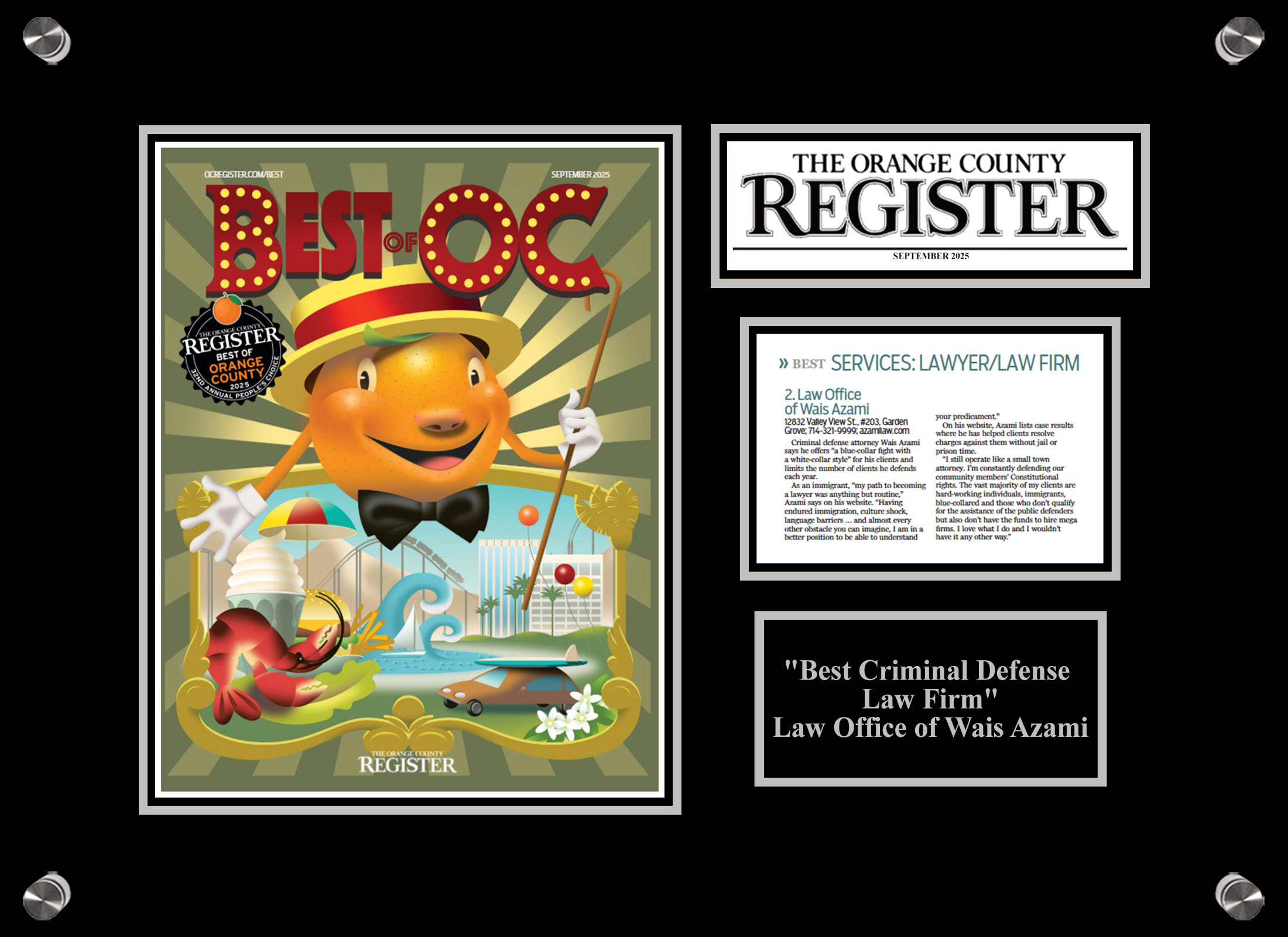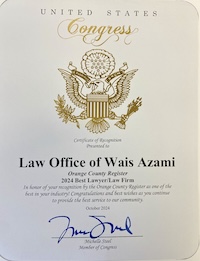Best of OC: Best Lawyer - Law Firm 2024 & 2025
Expungement of Criminal Records

Wais Azami is an OC expungement attorney who can help you with a clean criminal record by filing a motion to expunge your conviction. We routinely help people file the lengthy paperwork and go to court, if needed.
We service Petitions for Dismissal or Expungement for convictions of misdemeanors to felonies. You will likely qualify if you were:
- Placed on probation for the offense (even if you served State Prison time in County Jail),
- Are off of probation,
- Completed all the terms of your probation including paying all costs, fees/fines and restitution if applicable (*new laws have removed the restitution payoff requirement), and
- You do not currently have an open pending case
What is an Expungement?
You must understand that if your petition is granted under Penal Code 1203.4, your case is not sealed. Your criminal record is not actually “expunged” under this statute. That term is misleading in that it implies a complete erasure. A better proper term is “dismissal” or withdrawal of a prior guilty plea. The petition asks the court to re-open the criminal case, withdraw your guilty plea or no contest plea, and to set aside the conviction and dismiss the case in its entirety.
If the petition is granted by a Judge, the petitioner will no longer be deemed convicted of the crime by the State of California. The criminal record will be permanently removed to show a dismissal which reads “dismissed pursuant to Penal Code section 1203.4” rather than a conviction. Once the conviction is expunged, you can legally and truthfully write on any application for employment that you have not been convicted of a crime. The dismissed conviction will not show on most background checks. The databases which display criminal records will automatically update within 30-45 days after an expungement is granted.
What Can an Expungement Do Exactly?
- Allow you to take back your original “guilty plea.”
- Result in a new entry in the court record showing the dismissal of the case.
- Allow you to answer many, but not all, job applications that you have not been convicted of. If, however, you are applying for a government job or a job that requires a government-issued license, certificate, or permit, or a job that involves a security clearance, the conviction will be discovered; in such cases, you should disclose the initial conviction and its later expungement.
- Prevent the use of the conviction to impeach you if you testify as a witness unless you are being tried for a subsequent offense.
- If the conviction was for a felony, expungement is the first step in obtaining a pardon.
- Recent changes in the law may allow certain individuals to qualify for an expungement even if they still owe money for restitution.
Expungement will not:
- Remove the conviction from your “Rap Sheet” – California and FBI criminal history records will still show the conviction and the later dismissal “per PC 1203.4”;
- Reinstate the right to possess firearms, it was taken away (reduction to a misdemeanor may accomplish this if the offense is not one of violence;)
- Remove the requirement to register as a sex offender per PC290. If the expungement is granted, registrants must then complete and file paperwork requesting a Certificate of Rehabilitation, when eligible. A Certificate of Rehabilitation will relieve specified sex offenders from further registration. This is true for both felony and misdemeanor convictions.
- Allow you to omit the conviction from applications for government-issued licenses.
- Seal or otherwise remove the court case file from public inspection; anyone who knows where to look will be able to find the court case file (probation reports are in confidential files and are not subject to public inspection 90 days after sentencing).
- Prevent the conviction from being used as a “prior” or “strike prior” to increase punishment on a subsequent conviction.
- Prevent the conviction from being used for impeachment purposes on a subsequent offense.
- Prevent the conviction from being considered and used to refuse or revoke government licenses and permits such as real estate sales licenses, teaching credentials, bus driver licenses, security guard certificates, etc.; however, the expungement may reduce the weight given the conviction by the licensing agency.
- Prevent the conviction from being used by INS for removal and exclusion purposes.
More than one case needing expungement?
Each conviction/case must be handled separately and a petition for dismissal would need to be filed for each conviction needing an expungement. We offer discounts for any additional cases needing to be expunged.
We will attend all expungement hearing(s) at the court to argue your case on your behalf. Most of the time you will not be required to attend any hearings. The whole process takes 3 to 4 months, but usually can be completed within two months. The courts take cases on a first come first serve basis, but larger and busier courts take longer than normal.
Reduction of a Felony to a Misdemeanor
A 17(b) motion can help reduce certain felonies down to a misdemeanor where eventually you could ask for an expungement. Not all crimes are able to be reduced but if you call our office, we would be glad to evaluate your case for free.
Certificate of Rehabilitation
A Certificate of Rehabilitation (“COR”) is a California court-order declaring that a person previously convicted of a felony (or misdemeanor sex offense) is now rehabilitated. The purpose of the COR is to restore civil and political rights of citizenship to ex-felons who have proved their rehabilitation.
Certificate of Rehabilitation will:
- Relieve some sex offenders, as specified, of further duty to register. (Pen. Code, § 290.5.)
- Enhance a felon’s potential for licensing consideration by a State board. (Pen. Code, § 4853.)
- Serve as an official document to demonstrate a felon’s rehabilitation, which could enhance employment possibilities.
- Serve as an automatic application for a gubernatorial pardon.
Certificate of Rehabilitation will not:
- Erase the felony conviction or seal the criminal record. (Pen. Code, § 4852.17.)
- Prevent the offense from being considered as a prior conviction if the person is later convicted of a new offense.
- Allow a felon to answer on employment applications that he/she has no record of conviction.
- Give a felon the right to vote, because this right is automatically restored after discharge from parole.
- Restore the right to own or possess firearms.
Alternative to Expungement is a Governor’s Pardon:
People who have been convicted of a crime in California may apply to the Governor for a gubernatorial pardon. A gubernatorial pardon is an honor that could be granted to people who have demonstrated exemplary behavior following their convictions. A pardon will only be granted if it’s earned. Pardons are very rarely given.
Generally, the first step in applying for a pardon is to obtain a Certificate of Rehabilitation from the Superior Court in the county where the applicant currently lives. People who live outside of California and people who are ineligible for a Certificate of Rehabilitation must use the Application for Gubernatorial Pardon. The procedure used will depend on the circumstances of each applicant.
Pardon will:
- Allow a felon to serve on a jury trial. (Code Civ. Proc., § 203 subd. (a)(5)).
- Allow restoration of firearms rights, upon federal approval, to specified offenders who have obtained a certificate of rehabilitation if granted a full and unconditional pardon, unless the conviction was for a felony involving the use of a dangerous weapon. (Pen. Code, §4852.17).
- Allow a felon to be considered for appointment as a county probation officer or a state parole agent, but not to any other peace officer positions. (Gov. Code, § 1029, sub. (c)).
- Allow specified sex offenders still required.
- to register after obtaining a Certificate of Rehabilitation to be relieved of their duty to register if granted a full and unconditional pardon. (Pen. Code, § 290.5.)
Pardon will not:
- Seal or erase the record of conviction. (Pen. Code, § 4852.17).
- Prevent the pardoned offense from being considered as a prior conviction if the person is later convicted of a new offense.
- Allow a pardoned person to answer on employment applications that he/she has no record of conviction.
- Restore the ability to own a firearm to felons convicted of any offense involving the use of a dangerous weapon. (Pen. Code, § 4854).
- Pardon convictions from another state, or federal convictions.
- Necessarily prevent deportation.
How do I clean my criminal record with an expungement?
Call the Law Offices of Wais Azami at (714) 321-9999. Or schedule a *free consultation with our expungement lawyer in Orange County here. We will see if you qualify and then proceed to file the necessary paperwork.














